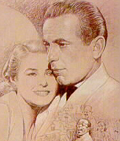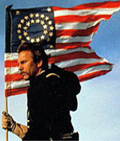|
Study Guide -
Guess Who's Coming to Dinner (1968)
Director : Stanley Kramer
Stars :
Spencer Tracy .... Matt Drayton
Sidney Poitier .... John Prentice
Katharine Hepburn .... Christina Drayton
Katharine Houghton .... Joanna Drayton
Cecil Kellaway .... Monsignor Ryan
Beah Richards .... Mrs. Prentice
Roy Glenn .... Mr. Prentice
Isabel Sanford .... Tillie
Preparation :
Read the movie reviews by Orbital Review and Roger Ebert
Historical/Social Significance :
"Along with To Kill A Mockingbird (1962), Guess Who's Coming to Dinner is an important movie about racial tensions and relations in an era when the Civil Rights Movement was still gripping the nation and both cultures of people were trying to deal with great changes. Tillie (Isabel Sanford), the black maid for the Drayton's, says, "Civil Rights is one thing. This here is something else," referring to the romance between John and Joey. Although named to the American Film Institute's top 100 greatest movies list, Guess Who's Coming to Dinner seems to be a largely forgotten film that does not receive the modern attention that it deserves for its excellent dialogue, great acting, and strong plot concept that captures a period in time where the attitudes about interracial marriages were much different. " Jonathan Bowen Orbital Reviews
Synopsis :
Joey Drayton returns home from vacation and surprises her parents, she's engaged and her fiance is black.
Guided Questions for Viewing :
Assessment questions will be based on the following :
-
Contrast the views of the two fathers with the two mothers.
-
Discuss the attitude of Tillie the maid towards the marriage. Why do you think her views were included so prominently?
-
The movie has been criticized as having been too contrived, in particular John Prentice was said to be too perfect. Do you agree? Why was this done?
-
Discuss the changes made by three different characters as the story goes on.
-
Do you think this movie is a "cop out"? Should it have been bolder, more daring, more controversial? Reference the movie and the time in which it was made in your answer.
-
Do you think this movie is still has something to say to contemporary audiences? Comment with reference to the movie.
Sources:
Ebert, Roger "Guess Who's Coming to Dinner" http://rogerebert.com
Bowen, Jonathan. "Guess Who's Coming to Dinner" ORBITALREVIEWS http://orbitalreviews.com/movies/ComingToDinner.html
|



